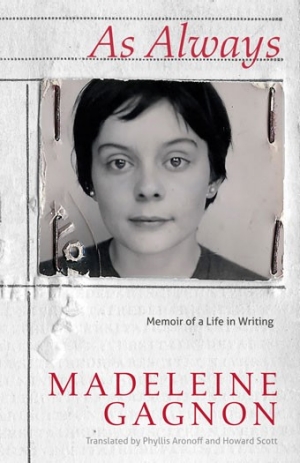And girls had the fewest freedoms of all. Had no right to learn to swim. Nor to play tennis or any other sport. The boys in the classical colleges would come back every summer with tales of their athletic feats, which we poor girls could only admire and envy. There was a Boy Scout troop but no Girl Guide troop, despite the journey my friends and I made to the archdiocese of Rimouski to plead for one to be established, a request that was refused without any discussion, with the peremptory authority typical of the time. We had come back to the village determined to secretly form our own troop, with the support of our mothers and of the provincial commissioner, Blandine Neault, to whom I had written. As she requested, we sent the money for our dues, and she mailed us a huge parcel containing the uniforms we had dreamed of, in which we paraded down the main street every week: regulation hat, short skirt, belt with a dagger (a dagger that gave you strength and power!), whistle, and neckerchief, everything needed to impress and defy the adults, and frighten some of them. I became the leader of the troop of girls aged between twelve and fourteen. Of course, we had no chaplain. But it was decided that I would fill that role, and I did so willingly.
At that time, in that archdiocese, dance had been proclaimed a mortal sin from every pulpit. We danced, of course, at Camp Cartier on Saturday night, but our hearts were divided, half in heaven, half in hell.
I remember a story that was often recounted by the adults: Papa’s younger sister Gisèle was happily riding a bicycle belonging to one of her brothers and she met Father Caron walking, as always, with his cane and wearing his big black felt hat. He was coming toward her as she went down a hill at full speed, her hair and her skirt flying in the wind, and she heard him shout “Shameless hussy” and felt a blow on her legs from his cane. He shouted, “Go home, you’re not allowed to use that machine, it’s reserved for the stronger sex. You will come to confession on Saturday.”
#CUalumni


 Phyllis Aronoff, MA (Eng.) 92
Phyllis Aronoff, MA (Eng.) 92
 Howard Scott, BA (translation) 79, MA 84
Howard Scott, BA (translation) 79, MA 84
 As Always, translated by Phyllis Aronoff, MA (Eng.) 92, and Howard Scott, BA (translation) 79, MA 84
As Always, translated by Phyllis Aronoff, MA (Eng.) 92, and Howard Scott, BA (translation) 79, MA 84